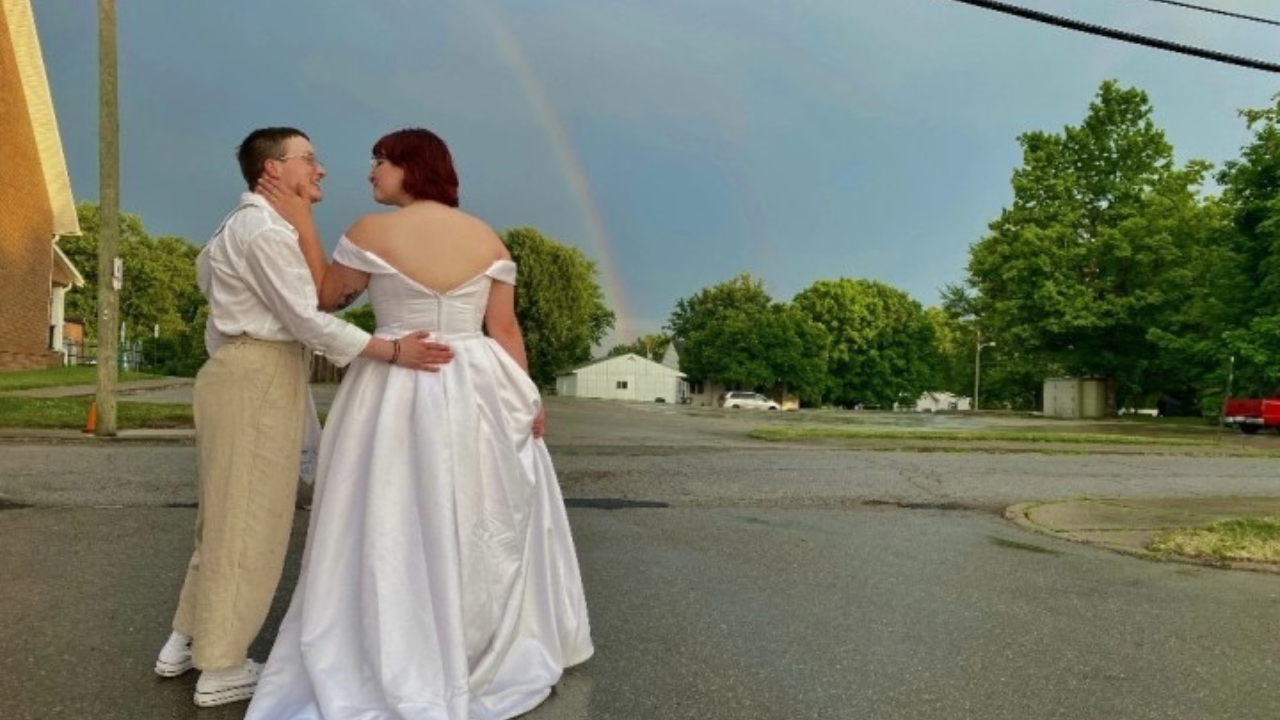COLUMBUS, Ohio (WCMH) — A transgender Ohioan says Statehouse legislation fostering an increasingly anti-LGBTQ+ climate is why he’s leaving the state.
Bennett Lovejoy, a 25-year-old trans man, moved to Ohio several years ago and began working as an education and research manager for Kaleidoscope Youth Center, a Columbus nonprofit providing housing and programming for LGBTQ+ youth. Although Lovejoy is fond of his initial Ohio years, his experience has soured as lawmakers have pursued bills restricting the trans community.
That legislation has manifested real-world hostility, Lovejoy said, citing a recent incident in Lewis Center when he and a friend were confronted for being trans.
“I was very much harassed, and it was me and my trans friend who also looks queer,” Lovejoy told NBC4. “My dog was off leash, but I was putting him back on the leash and this guy came up and started accosting us and shouting sexual expletives. Then, he chased us out of the park and took photos of our license plates. At that point, I was like, I’m gonna hit the road.”
Incidents like this are why Lovejoy said he has retreated from public life in Ohio, no longer using public restrooms, attending sporting events or eating out at restaurants. The 25-year-old has a select few “designated safe zone” places that he knows support the trans community, or have a gender-neutral restroom.
These experiences, compounded with recent Trump administration orders, are why Lovejoy and his wife, alongside her family, say they are moving to Chicago on Sunday in search of a community accepting of LGBTQ+ people.

Foiled education plans
In moving, Lovejoy is leaving behind an uncompleted master’s degree in translational data analytics from the Ohio State University.
He enrolled in fall 2023, and said the coursework provided him the capability to pursue a data science internship at Policy Matters Ohio, a nonprofit research institute. Those skills also yielded him a policy analyst position at Scioto Analysis and an independent contractor role at Rooted Analytics, both of which he’s currently employed part time.
Still, Lovejoy stepped away from his degree as he became increasingly concerned with state proposals limiting gender-affirming care, a range of medical and mental health services for members of the trans community.
“I dropped out because I had to spend my savings on top surgery,” said Lovejoy, referring to a chest reconstruction procedure often provided to trans people. “[Gov. Mike] DeWine was signing executive orders at the time that made it sound like I wouldn’t be able to get surgery, even as an adult.”
Although DeWine vetoed a bill banning gender-affirming care for trans youth in 2023, the Statehouse acted quickly to override him. Soon after, the governor tried to appease legislators by announcing a series of directives that included making Ohio one of the few states in the nation to also restrict gender-affirming care for adults.
DeWine’s proposal to limit trans adults didn’t come to fruition, but the bill prohibiting care for trans youth is in effect while litigation continues.
A wave of ‘anti-LGBTQ+’ bills
Beyond gender-affirming care restrictions, Lovejoy said a series of other Ohio “anti-LGBTQ+” bills aid in fostering an unwelcoming culture, making it difficult to live and work in the state.
Measures include requiring academic institutions to set separate bathrooms based on students’ “biological sex.” Columbus City Schools said this law is why the district reverted students’ names to those reflected on birth certificates and rescinded its trans and gender variant student policy in February.
DeWine also signed into law a bill coined by supporters as “The Parents’ Bill of Rights,” requiring teachers to notify parents before teaching “sexuality content” and of changes in a student’s mental or physical health. A national crisis hotline said it received a significant increase in calls from LGBTQ+ youth in Ohio within hours after the governor approved the measure.
The Statehouse reintroduced a bill in late April that opponents said would amount to a ban of drag queens in public. Lawmakers have debated a proposal to ban universities from asking students their preferred pronouns and another penalizing school districts that use students’ chosen name and pronouns without parent permission.
Ohio’s legislature has pursued these bills instead of repealing Ohio’s dormant same-sex marriage bans, removing antiquated HIV criminalization laws, passing a statewide conversion therapy ban, or prohibiting LGBTQ+ discrimination.
Still, when asked in March whether Ohio is fostering an unfriendly climate for LGBTQ+ residents, DeWine said he disagrees with those who argue the state is unwelcoming.
“I’d disagree with that, I would totally disagree with that,” said DeWine. “I don’t think we have done that. Look, you go back and look at everything that I have said as governor, in ‘State of the State’ speeches and other times, this should be a welcoming state. We want everybody to come to Ohio and feel welcomed in the state.”
‘It’s a choice for me to leave’
Lovejoy said he and members of his wife’s family, which includes several others identifying within the LGBTQ+ community, each came to their own conclusion that now is the time to leave.
That choice comes from privilege, Lovejoy said. While facing marginalization as a member of the trans community, Lovejoy emphasized that being white, young and middle class has “protected [him] in a lot of ways.”
“I think there’s something to be said about the fact that it’s a choice for me to leave it all, and it’s a hard one, I’m having to scrimp money together to make it happen,” he said. “But, I still have enough resources to make that interstate move happen. I’m not like a minor who can’t move, and I feel really bad for those guys.”










